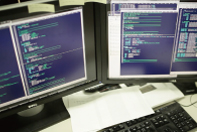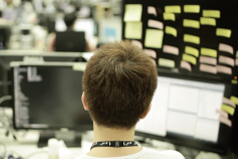(Continues from Part 2.)
Debugging the Company
 Since the olden days, different hardware has always had different programming rules, meaning that programmers have had to familiarize themselves with completely new sets of rules every time they started working on new hardware, so they needed to have a flexible mind. So I started thinking: maybe we can focus on the creative aspect in order to reduce this kind of burden. I’ve actually always wanted to create my own game engine at home, and back when PlatinumGames was still in the preliminary stage of starting its business, I would work hard on creating an engine by myself whenever I had some time to spare.
Since the olden days, different hardware has always had different programming rules, meaning that programmers have had to familiarize themselves with completely new sets of rules every time they started working on new hardware, so they needed to have a flexible mind. So I started thinking: maybe we can focus on the creative aspect in order to reduce this kind of burden. I’ve actually always wanted to create my own game engine at home, and back when PlatinumGames was still in the preliminary stage of starting its business, I would work hard on creating an engine by myself whenever I had some time to spare.
There’s a system called “DirectX,” and I used it to create a system capable of forgetting what kind of hardware it’s running on. I did that just as a hobby.
Then, when we started working on Bayonetta and we had to reduce the startup time, I brought out this engine I’d made, and used it to create pretty much everything we needed. This actually made me realize how large an influence the production environment itself has on the production process.
There are a lot of programmers at PlatinumGames that are very strongly inclined towards the creative side of things. These types of people are the ones who take the company forward, so the last thing you want to do is to obstruct other people with technological problems. Creating video games is a craft, so personnel expenses are obviously the highest. If you’re going to spend a set amount of time and a set amount of money, you’ll want to make the best product you possibly can. So the question becomes: what can we do to increase the efficiency of the production process? When I was part of a project, I always thought to myself: “If I do my best, the quality of the parts that I’m involved in will increase.” However, this is actually not enough when you look at the whole picture. So if there are any employees doing something that they think is really bothersome, it’s our department that offers to come up with an appropriate solution. In a certain sense, I think we’re the department that “debugs” the company, so to speak.
 Right now, I’m super busy, and I can hardly get around to all of the tasks I need to handle, but I’m getting by because other staff members are helping me out. Personally, however, I want to extend my area of expertise even further. Compared to the days of yore, there are so many more elements to the production process nowadays, be it music, video, or whatever, it isn’t even funny. Video games have become unbelievably complicated over the past 20 years. This means that you have to reconsider the game creation process pretty much every 2 or 3 years, in order not to fall behind. We’re entering our 10th year since the establishment of the company, and the 6th year since the establishment of the Technology Strategic Planning Team, so it’s about time we started reconsidering the process again. We have to look at both the management of the company and the way we make games, and tie our game creation process in with the technological side of things, in order to decide what kind of technology we can use next, what kind of structures our games will run on, and what we should be doing from here on out.
Right now, I’m super busy, and I can hardly get around to all of the tasks I need to handle, but I’m getting by because other staff members are helping me out. Personally, however, I want to extend my area of expertise even further. Compared to the days of yore, there are so many more elements to the production process nowadays, be it music, video, or whatever, it isn’t even funny. Video games have become unbelievably complicated over the past 20 years. This means that you have to reconsider the game creation process pretty much every 2 or 3 years, in order not to fall behind. We’re entering our 10th year since the establishment of the company, and the 6th year since the establishment of the Technology Strategic Planning Team, so it’s about time we started reconsidering the process again. We have to look at both the management of the company and the way we make games, and tie our game creation process in with the technological side of things, in order to decide what kind of technology we can use next, what kind of structures our games will run on, and what we should be doing from here on out.
PlatinumGames is like a child caught between playing field and a laboratory. By playing field, I mean a location where we can use the skills we’ve cultivated and test their potential. The playing field is where you get your first chance at showing the results of what you’ve learned. By laboratory, on the other hand, I mean something like our own small castle. A place where we can do whatever we want, mess around a bit, and be pleased with the things we pull off. It’s an important place for finding out where your capabilities lie, for trying out many different things, and for generally going “I wonder what happens when I do this…?”
interview by editorial studio MUESUM (2012/07/13)